Dog-mediated rabies is a major concern in many parts of Asia and Africa, being almost always fatal once symptoms appear. One Health approaches have gained precedence for addressing health problems that cut across humans and animals, especially rabies. India has large street dog populations and carries 35% of the global rabies burden despite long-standing rabies prevention initiatives.

In this project, we investigate why rabies persists as a public health problem in India.
We build on our pilot research that suggests that the answer may lie in insufficient understandings of everyday people-dog relations. We combine human geography, history, behavioural ecology, and social psychology to study people-dog interactions, dog ecology, and rabies prevention efforts in urban and rural India and develop strategies for community health.
Revisiting the (post)colonial One Health conceptualisation of street dogs as primarily disease vectors, our analytical framework of multispecies cultures directs new inter-disciplinary attention to the lived experiences of human and nonhuman animal actors. Our study’s significance lies in its departure from the singular emphasis on ‘stray’ dog control by incorporating local understandings of street dogs as part of society, and examining positive and negative dimensions of interspecies health in urban, rural, and peri-urban India.

Our team brings together expertise from human geography, history, behavioural ecology/ethology, and social psychology.
We examine historical and contemporary transnational influences on dog-related public health agendas; public attitudes and knowledge; everyday interactions between people, dogs, and the biophysical environment; and institutional interventions to advance decolonial concepts and practices for healthy societies.
We seek to answer four main research questions about human-street dog relations and rabies in India:
- What are the continuities and discontinuities in how dogs have figured in national and international public health agendas since the nineteenth century?
- What are the evolving and varied aspects of people-street dog relationships in urban, peri-urban and rural India?
- What are the biosocial conditions that frame people-street dog conflict, including rabies transmission?
- What concepts, interventions, and strategies enable healthy habitats and decolonized approaches to zoonoses?
The project runs from September 2021 to August 2026 and is funded by the Wellcome Trust.